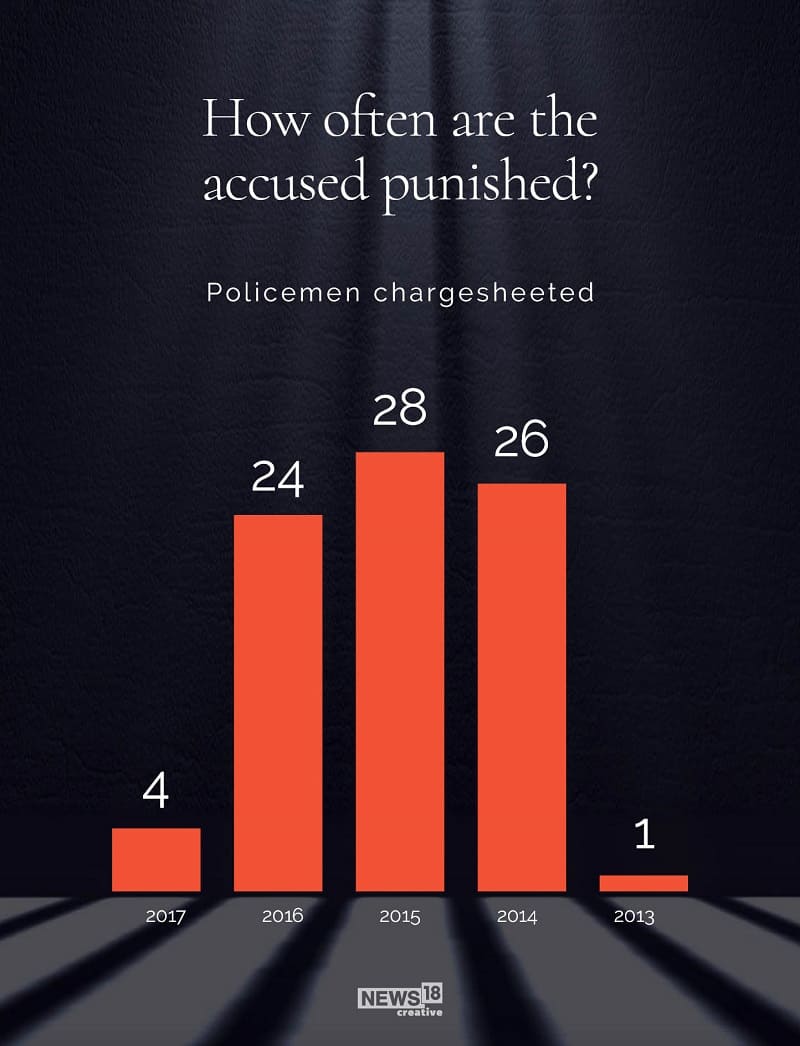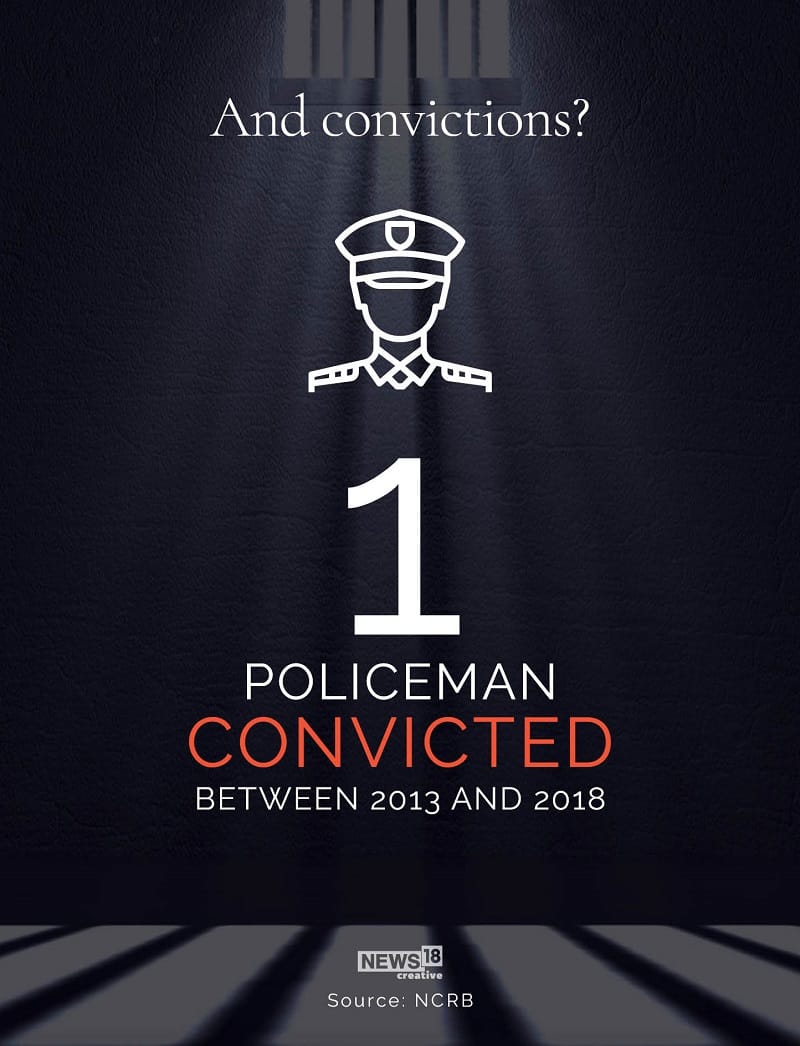Custodial deaths of Jayaraj and Fenix in Tamil Nadu’s Thoothukudi are being pegged as India’s George Floyd moment
The death of a father and son, due to alleged police brutalities, led to massive public outcry in Tamil Nadu and across India this week.
News of P Jayaraj (62) and J Fenix (32)’s death in police custody in Tamil Nadu’s Thoothukudi district spread like wildfire on social media and was quickly picked up by national media.
This soon evolved into a national conversation not only about their death, but also about the larger issues of police brutality and custodial deaths in the country.
Their death triggered a furore demanding justice for the father-son duo. Several politicians and celebrities also came forward and spoke against police brutality.
Referring to the case, the Indian Police Service (IPS) Association condemned "acts of violence against citizens in police custody".
"We exhort the investigation agencies to investigate the case of Tuticorin district expeditiously and fairly," the association's handle tweeted.
Former Congress president Rahul Gandhi said: “Police brutality is a terrible crime. It’s a tragedy when our protectors turn into oppressors. I offer my condolences to the family of the victims and appeal to the government to ensure justice.”
Striking a visibly angry pose, actor-turned-politician Rajinikanth described the incident as "brutal killing" and expressed shock over the 'inappropriate behaviour' of some police officers.
"#sathyama vidave koodathu (this should not be spared at any cost,)," the actor said in a tweet in Tamil.
The National Human Rights Commission (NHRC), on July 1, said it has issued notices to the DGP of Tamil Nadu and SP of Thoothukudi district regarding the matter.
NHRC also said in a tweet that it has sought a report from the police officers, which has to "include inquest report, post-mortem examination report, medical treatment record, magisterial inquiry report and health screening report of both victims, within six weeks".
The case
On June 19, Fenix was in his mobile phone shop near the Kamarajar statue in Sathankulam town, Thoothukudi (erstwhile Tuticorin) when his friend informed him that his father Jayaraj had been picked up by the police.
The 32-year-old rushed to the Sathankulam police station where he was called in by police officers for an ‘inquiry’.
On June 21, they were remanded in judicial custody and lodged in Kovilpatti jail in the town.
According to initial claims by the police, Jayaraj had allegedly made critical remarks against the cops for insisting that shops should shut in accordance with lockdown rules in place to help curb the novel coronavirus outbreak.
The two were booked under Section 188 (disobedience to order duly promulgated by public servant), 353 (use of force to deter public servant from duty) 269 (negligent act likely to spread infection of disease dangerous to life) and 506(2) (punishment for criminal intimidation) of the Indian Penal Code (IPC).
On June 23, Fenix’s family and friends were informed by the police that the father and son had died at the Kovilpatti Government Hospital. The hospital is around 100 kilometres from Sathankulam.
The victims' family members claimed that they had no knowledge of their arrests until then.
Their family claimed that the father and son were brutally thrashed and subjected to extreme torture by police personnel while in custody.
Due to continuous bleeding and severe external and internal injuries from alleged police torture, Fenix had died late evening on June 22. His father had died in the early hours of June 23.
A government doctor’s report also confirmed that the two had suffered multiple injuries.
The doctor, who was attached to the Kovilpatti Government Hospital, was summoned to examine the detainees on June 20; he reported that both the father and the son had sustained injuries in the gluteal region. The doctor added that Fenix had also suffered an injury on his right knee.
Witnessed claimed that they were bleeding and were also sodomised.
Amid rising public furore, the police registered cases of suspicious deaths.
On June 25, a Madurai bench of the Madras High Court instructed Tamil Nadu police to inform the public about the suo motu cognisance the court had taken over the matter.
The Judicial Magistrate probing the deaths had earlier informed the High Court bench that police personnel at the Sathankulam station did not cooperate with him, even as one of the constables made disparaging remarks against him.
Another policeman had allegedly displayed "intimidating, macho body language".
On June 30, the High Court directed Crime Branch-Criminal Investigation Department (CB-CID)’s Tirunelveli DSP Anil Kumar to probe the matter although the state government had transferred the case to the Central Bureau of Investigation (CBI).
Subsequently, Inspector Sridhar, sub Inspectors Raghu Ganesh and Balakrishnan and constable Murugan were arrested by the CB-CID.
The case is now being pegged as India’s own George Floyd moment. Floyd, a 46-year-old African-American, was handcuffed and pinned to the ground in Minneapolis, United States by a white police officer who kneeled on his neck as he gasped for breath.
His death on May 25 had triggered violent protests across the US, leading to the death of at least five persons, arrest of over 4,000 people and damage to property worth billions of dollars.
Jayaraj and Fenix’s custodial death is not the first incident of its kind in India. Thousands of cases have been reported in the last decade alone. Yet, the conviction rate remains low.
India’s history with custodial death and police brutality
In March 2018, the Ministry of Home Affairs (MHA) while replying to a question informed the Rajya Sabha that the National Human Rights Commission (NHRC) had registered total 1,674 cases of custodial deaths between April 1, 2017 and February 28, 2018. This included 1,530 deaths in judicial custody and 144 deaths in police custody.
As many as 1,674 deaths in 334 days would translate to more than five deaths in custody per day.
The highest number of custodial deaths during the above mentioned period took place in Uttar Pradesh (374), followed by Maharashtra (137), West Bengal (132), Punjab (128), Madhya Pradesh (113), Bihar (109), Rajasthan (89) and Tamil Nadu (76).
As many as 61 such deaths were reported in Gujarat, followed by Odisha (56), Jharkhand (55), Chhattisgarh (54), Haryana (48), Delhi (47), Assam (37), Andhra Pradesh (35), Uttarakhand and Telangana (17 each), Karnataka (15), Himachal Pradesh (8), Arunachal Pradesh and Tripura (6 each), Jammu & Kashmir and Meghalaya (4 each) and Mizoram (3). Two such deaths were reported each in Manipur, Chandigarh, Sikkim and Nagaland.
According to MHA’s response, there were no custodial deaths reported in Goa, Dadra & Nagar Haveli, Andaman & Nicobar, Daman & Diu, Lakshadweep and Puducherry during this period.
However, there is seemingly another layer to police brutality in India. According to the ‘Status of Policing in India’ report published by Common Cause and CSDS in 2019, 50 percent police personnel have a bias against Muslims and think they are more likely to committing acts of violence.
 How often are the accused punished? (Image: News18 Creative)
How often are the accused punished? (Image: News18 Creative)
The report adds that of the 1,731 people killed in custody in year 2019, 60 percent of the victims belonged to marginalised communities such as Muslims, Dalits, Adivasis/tribals, non-literate and the poor.
Moreover, India has not ratified the United Nations' Convention against Torture which aims to prevent torture and other acts of cruel, inhuman, or degrading treatment or punishment.
What the law says
According to the law, the police must take those arrested for medical examination. A doctor is required to list any pre-existing injuries as new wounds are evidence of custodial abuse.
Any person who gets arrested must be produced before a Magistrate within 24 hours. The magistrate needs to inspect documents and ensure the suspect’s well-being by questioning them.
According to a Live Law report, the magistrate did not notice Jayaraj and Fenix’s wounds as the Magistrate reportedly examined the duo “in dim light inside the police vehicle”.
Further, the Magistrate reportedly transferred them to judicial custody even though the law states that people should only be detained for offenses punishable by up to seven years in prison, when it is necessary.
The way forward
In 2006, the Supreme Court of India, in the Prakash Singh vs Union of India case, had directed states to establish Police Complaints Authorities at both the state and the district levels.
According to the apex court, recommendations of these authorities against police personnel would be binding.
The court also said the National Police Commission (NPC) had dealt with modalities for inquiries into complaints of police misconduct in its first report in 1979. However, the recommendations made across multiple NPC reports had not been implemented. The top court said that this had forced it to issue binding directions till required legislations were passed by states.
 Convictions in such cases (Image: News18 Creative)
Convictions in such cases (Image: News18 Creative)
A study by Commonwealth Human Rights Initiative (CHRI) published in 2018 had showed that only 18 states had passed new Police Acts since SC’s 2006 directive. While others had issued orders or notifications, none of them had incorporated them in full conformity with the Court’s scheme.
Human Rights Watch, international non-governmental organization which conducts research and advocacy on human rights, has recommended stricter enforce existing laws regarding arrest and detention. The organisation also recommends implementation of Supreme Court’s DK Basu judgements which pertain particularly to recording detentions, informing families, producing suspects before magistrates and carrying out medical examinations.
HRW has urged that police officers found guilty of torture and other ill-treatments should be disciplined or prosecuted when required, ratification of the Convention against Torture and incorporation of its provisions into India’s law.
Parliament had earlier considered The Prevention of Torture Bill (2017) to “provide punishment for torture inflicted by public servants” or by “any person inflicting torture with the consent or acquiescence of any public servant” and related matters.
According to the draft bill suggested that punishment for such offences would be imprisonment for a term not less than three years, but extendable to 10 years and a penalty.
However, the Bill lapsed with the 16th Lok Sabha dissolved in 2019.
Since the Jayaraj-Fenix case came to light, the Tamil Nadu Police removed over 80 police officers in the Trichy range for want of "interpersonal skills" while dealing with the public.
"We are removing 80 police personnel in Trichy police range who need behavioural correction to improve their interpersonal skills. They are taken off duties involving direct public contact as their track record in that aspect is found wanting," Deputy Inspector General of Police (Trichy Range) V Balakrishnan said in a Facebook post.
The DIG added that they would be gradually reintegrated into regular duties “only after completing a specially designed course with CBT (Cognitive Behavioural Therapy)” that would involve a component to improve “the way they deal with the public".







